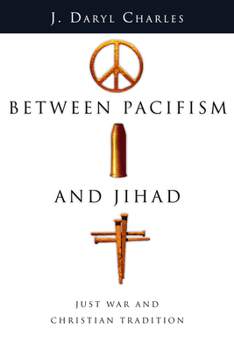Between Pacifism and Jihad: Just War and Christian Tradition
Select Format
Select Condition 
Book Overview
Pacifism, jihad and militarism--are these the only alternatives to global injustice? J. Daryl Charles considers the "just war" teaching of the church throughout history, comparing it with both pacifism and jihad/militarism and addressing the unique challenges of international injustice and global terrorism.
Format:Paperback
Language:English
ISBN:0830827722
ISBN13:9780830827725
Release Date:May 2005
Publisher:IVP Academic
Length:197 Pages
Weight:0.90 lbs.
Dimensions:0.6" x 6.3" x 9.2"
Customer Reviews
1 rating
Moral Clarity in an Age of Terrorism
Published by Thriftbooks.com User , 19 years ago
Over 20 years ago Christian social commentator Michael Novak wrote a book entitled Moral Clarity in the Nuclear Age. In it he urged us to think clearly and with moral discernment about the issues of nuclear deterrence, justice and warfare. This volume serves a similar function, except in the context of the modern dilemma of international terrorism. The main focus of the book however is to provide a thorough description and defense of classic just war theory. Written by a Christian ethicist mainly for the Christian community, the author lays out the various options relating to issues of war and peace. Of course the two major options throughout church history have been pacifism and just war doctrine. The former, while always a minority opinion, has had many champions throughout the ages. The latter position, just war theory, has had a long and honorable heritage, both in religious and non-religious circles. The position holds, in brief, that there are some occasions in which a war may be fought with moral justification. It stipulates some of the reasons why it may be just to enter into such a conflict (jus ad bellum) and how such a war may be justly waged (jus in bello). Charles traces the development of this doctrine through Christian history, and seeks to defend it in the face of numerous objections. Like Novak before him, he especially seeks to sharpen our moral clarity concerning the difficult questions raised in the debate, and equip believers to think deeply and critically about how their faith intersects with such contentious social and political issues. And like Novak, he is unhappy with the sloppy thinking and muddied moral waters that often occur in these debates. Just as Novak could object to the foolish notion of moral equivalence prominent during the Cold War era (which sought to show that there was no moral difference between the free and democratic West and the oppressive Marxist regimes), so Charles rejects the glib claims that actions to resist international terrorism are no better morally than the terrorist act themselves. If Novak had to deal with moral myopia and intellectual vandalism at the time of the Cold War era debates, the matters have only gotten worse. As Charles points out, our post-modern climate has only exasperated the problem. Not only are we no longer thinking with moral clarity and vigor, but we have abandoned the very notion of a moral framework in which to make ethical judgments. Indeed, post-modernism discourages us from making moral judgements at all. Thus the need to once again state the case for just war theory, to show its historical and intellectual roots, and to demonstrate how it is an important tool by which we assess armed conflict and geo-political conflict. The urgency of the terrorist threat requires some hard thinking, moral realism, and theological discernment. As such a number of issues are canvassed. For example, does the biblical injunction against vengeance preclude the right of nation





